|
|
|
Sort Order |
|
|
|
Items / Page
|
|
|
|
|
|
|
| Srl | Item |
| 1 |
ID:
131857
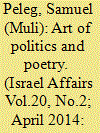

|
|
|
|
|
| Publication |
2014.
|
| Summary/Abstract |
The article demonstrates the potency and volatility of political lyricism by comparing two masters of the trade, the French Jacques Prevert and the Israeli Aryeh Sivan. Although writing in two dissimilar cultures and witnessing disparate political environments, the poetry of Prevert and Sivan is similar in many ways. They are both keen observers of their societies' woes and both are equally critical. Their accounts are s are emphatic and caring and strewn in their passionate, affectionate and brutally honest verses, Prevert and Sivan are the quintessential models for contemporary political poetry. Both poets, despite their disparate cultures and dissimilar local experiences, painstakingly probe and penetrate the political realities around them with velvet nails
|
|
|
|
|
|
|
|
|
|
|
|
|
|
|
|
| 2 |
ID:
090175
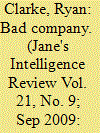

|
|
|
|
|
| Publication |
2009.
|
| Summary/Abstract |
While the militant threat continues to preoccupy security forces in India and Pakistan, organised crime remains an ongoing threat to state stability, particularly D Company, the major regional criminal organisation.
|
|
|
|
|
|
|
|
|
|
|
|
|
|
|
|
| 3 |
ID:
152189
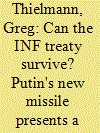

|
|
|
| 4 |
ID:
119035
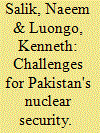

|
|
|
| 5 |
ID:
139294
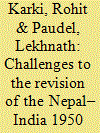

|
|
|
|
|
| Summary/Abstract |
The contemporary strategic and political environment has gone through tremendous changes in comparison to the context in which the 1950 treaty was signed. The Indian prime minister Narendra Modi’s August 2014 visit to Nepal, the first by an Indian prime minister in 17 years, has rekindled the hope of improving Nepal–India relations, including revision of the 1950 treaty. Against this backdrop, this article argues that without understanding India’s strategic, security-related and political concerns, revision of the 1950 treaty is highly unlikely. The article further argues that by identifying and addressing the key challenges, both countries can develop a shared strategic vision which in turn can provide an enhanced framework for the revision of the 1950 treaty and further strengthen the ‘special’ Nepal–India relationship in the changed strategic context of the 21st century.
|
|
|
|
|
|
|
|
|
|
|
|
|
|
|
|
| 6 |
ID:
137163
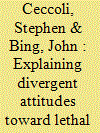

|
|
|
|
|
| Summary/Abstract |
Although lethal drone strikes have become a central component of the U.S. campaign against international terrorism, the program remains a low salience issue with considerable bi-partisan consensus and a supportive U.S. general public. This article explains American attitudes toward lethal drone strikes by testing arguments based on partisanship and ideology, core values and abstract beliefs, and elite cues. Results suggest that respondent core values and governmental cues offer important insights. Consequently, the political environment under certain conditions may not frame important issues in such a way that the general public is likely to gain a knowledgeable understanding of the alternatives.
|
|
|
|
|
|
|
|
|
|
|
|
|
|
|
|
| 7 |
ID:
120983
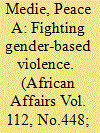

|
|
|
|
|
| Publication |
2013.
|
| Summary/Abstract |
Many African states have adopted laws that criminalize rape and other forms of gender-based violence (GBV), but the enforcement of such laws is often weak. Many rape cases are never brought to court and victims are frequently encouraged to accept reconciliation instead of prosecution of offenders. Drawing on research from post-conflict Liberia, this article investigates the ability of women's movements to influence the state's implementation of rape law, and seeks to theorize the relationship between women's activism and the enforcement of rape law. It documents the range of strategies adopted by the Liberian women's movement, and argues that these tactics have contributed to an increased referral of rape cases to court. This was made possible by two conditions: a relatively open political environment and political and material support from international organizations, which in turn enabled women's NGOs to gain access to and make an impression on the implementation process. This demonstrates the capacity of civil society organizations in Africa's more open and internationally connected states to influence policy at the implementation stage-even in particularly challenging areas such as women's rights.
|
|
|
|
|
|
|
|
|
|
|
|
|
|
|
|
| 8 |
ID:
153769
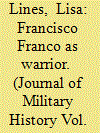

|
|
|
|
|
| Summary/Abstract |
Although he was the military leader of the winning Nationalist side during the Spanish Civil War, Francisco Franco’s place in history has been largely defined by his subsequent long-term political role as head of the Spanish fascist state. Up to now, those historians who have assessed his military acumen have tended to give him low marks, particularly on the grounds that his poor grasp of strategy and tactics unnecessarily prolonged the Civil War and led to an inordinately high number of casualties. Recently, however, some historians have begun to reconsider Franco’s skills as a military leader, by viewing his performance within the context of his own cultural and political environment, rather than that of a later era or of other national military traditions.
|
|
|
|
|
|
|
|
|
|
|
|
|
|
|
|
| 9 |
ID:
117543
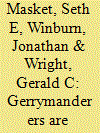

|
|
|
|
|
| Publication |
2012.
|
| Summary/Abstract |
Redistricting received substantial attention in the popular media in 2011, as states redrew state legislative and congressional district boundaries. Many reformers continue to argue for a de-politicization of the redistricting process, claiming that partisan redistricting is responsible for declining electoral competition and increasing legislative polarization. Our analysis of evidence from state legislatures during the last decade suggests that the effects of partisan redistricting on competition and polarization are small, considerably more nuanced than reformers would suggest, and overwhelmed by other aspects of the political environment.
|
|
|
|
|
|
|
|
|
|
|
|
|
|
|
|
| 10 |
ID:
137710
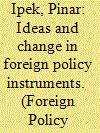

|
|
|
|
|
| Summary/Abstract |
Constructivism in the International Relations literature mainly focuses on the constitutive interaction between international norms and state actions. Few studies explore when ideas at the domestic level matter in foreign policy change. I propose a constructivist account for policy change that emphasizes not only ideas but also material interests as exogenous factors constituted within domestic structures. My empirical analysis in the case of the Turkish International Cooperation and Development Agency reveals important evidence demonstrating the influence of (i) shared normative values, mostly constituted by the foreign policy elite's intersubjective understanding of Turkey's historical roots and cultural ties in the region and (ii) material interests, favored through the “trading state” and framed by the convergence of principled and causal beliefs on policy change. Ideas matter in foreign policymaking when a set of contingent conditions is satisfied: (i) A small group of recognized foreign policy elite has shared normative beliefs and (ii) an enabling political environment exists, particularly a majority government facilitating foreign policy appointments to key positions so that a window of opportunity is provided for policy entrepreneurship.
|
|
|
|
|
|
|
|
|
|
|
|
|
|
|
|
| 11 |
ID:
128928
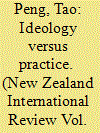

|
|
|
| 12 |
ID:
130184
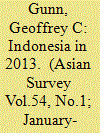

|
|
|
|
|
| Publication |
2014.
|
| Summary/Abstract |
Ahead of upcoming elections, expectations ran high in 2013 across the archipelago for a highly pluralistic electorate. With China as a leading trading partner, the backdrop for Indonesia was steady economic growth, albeit checked by a sliding currency, a current account deficit, and a depressing culture of corruption. Mixing commerce and geopolitics, China, the U.S., and Japan all turned to Indonesia to expand their influence.
|
|
|
|
|
|
|
|
|
|
|
|
|
|
|
|
| 13 |
ID:
102115


|
|
|
| 14 |
ID:
133889
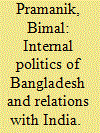

|
|
|
|
|
| Publication |
2014.
|
| Summary/Abstract |
In early 2013, political environment of Bangladesh more or less was against ruling AL Alliance. Public support was tilting towards Opposition. BNP exploited this situation and won five Corporation elections. In this situation, they went to hard bargaining for Care Taker Government (CTG). In fact, Bangladesh politics during the year of 2013 was largely guided by the difference between two main political parties BNP and AL. Ruling AL remained fixed to hold Jatiya Sansad Election under all party government headed by Prime Minister and BNP strongly wanted to hold election under non-party caretaker government.
|
|
|
|
|
|
|
|
|
|
|
|
|
|
|
|
| 15 |
ID:
133895
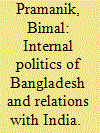

|
|
|
|
|
| Publication |
2014.
|
| Summary/Abstract |
In early 2013, political environment of Bangladesh more or less was against ruling AL Alliance. Public support was tilting towards Opposition. BNP exploited this situation and won five Corporation elections. In this situation, they went to hard bargaining for Care Taker Government (CTG). In fact, Bangladesh politics during the year of 2013 was largely guided by the difference between two main political parties BNP and AL. Ruling AL remained fixed to hold Jatiya Sansad Election under all party government headed by Prime Minister and BNP strongly wanted to hold election under non-party caretaker government.
|
|
|
|
|
|
|
|
|
|
|
|
|
|
|
|
| 16 |
ID:
132994
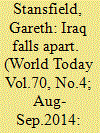

|
|
|
|
|
| Publication |
2014.
|
| Summary/Abstract |
The political and social environment among the Sunni rebels was primed for insurgency by 2013, if not before.
|
|
|
|
|
|
|
|
|
|
|
|
|
|
|
|
| 17 |
ID:
121024
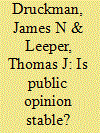

|
|
|
|
|
| Publication |
2012.
|
| Summary/Abstract |
Public opinion matters, both as a central element of democratic theory and as a substantive foundation for political representation. The origins and nature of public opinion have long attracted the attention of social scientists. Yet a number of questions remain; among the more perplexing is whether-and under what conditions-public opinion is stable. The answer depends in large part on whether one looks at aggregations of individual opinions (macro public opinion) or at the individual opinions themselves (micro public opinion). In this essay, we explore the macro/micro divide and offer a framework to determine when opinions are likely to be stable or volatile. This framework reflects both the content of the political environment and the nature of individuals' opinions. Using public opinion dynamics surrounding the Patriot Act as a primary example, we discuss the role of opinion stability in interpreting public opinion and in understanding the normative implications of public preferences.
|
|
|
|
|
|
|
|
|
|
|
|
|
|
|
|
| 18 |
ID:
112843
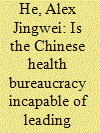

|
|
|
|
|
| Publication |
2012.
|
| Summary/Abstract |
The competency of the Chinese health bureaucracy has long been questioned in light of past healthcare reform failures. This article, however, by analysing the case of the Fujian Provincial Health Bureau and a policy intervention led by it aimed at curbing rampant cost inflation, demonstrates that with a conducive political environment and firm policy determination, it is possible to achieve effective cost containment without touching fundamental economic levers. The health bureaucracy is not inherently incapable. It still possesses essential authority and policy instruments to exercise strong stewardship. The reassertion of its legitimacy, reinforcement of government stewardship, restoration of the collapsed accountability mechanisms and realignment of government tools epitomise the experiences of Fujian's healthcare reforms.
|
|
|
|
|
|
|
|
|
|
|
|
|
|
|
|
| 19 |
ID:
139053
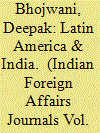

|
|
|
|
|
| Summary/Abstract |
The article outlines the relationship between India and that distant region, with which India has enjoyed a cordial relationship that has nevertheless not been as active as this emerging power has developed with any other region. This is despite the complementarity that is evident in the resource endowments of Latin America, India’s manufacturing prowess and its enormous market, mutually beneficial technological capabilities, etc. The article points out the areas of potential and urges a greater and more focussed activism on the part of the official and business establishments on both sides. The benevolent political environment, and the recent Latin American interest in India should galvanise the upward spiral of trade, investment, tourism and cultural exchanges.
|
|
|
|
|
|
|
|
|
|
|
|
|
|
|
|
| 20 |
ID:
120584
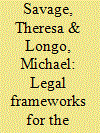

|
|
|
|
|
| Publication |
2013.
|
| Summary/Abstract |
The process of internationalisation is exerting pressure on governments around the world to recognise the rights of their indigenous peoples. This article investigates the current legal framework for minority language protection in Japan, where a history of assimilation has threatened the ancestral language and culture of the Ainu minority. The situation in Japan is contextualised within a broader discussion of minority language protection at global and European level in order to better understand the political environment in which a shift in policy for the protection of minority languages has begun. Although the implementation of a new law to promote Ainu culture has led to limited benefits for the Ainu, the fact that Japan continues to deny that the Ainu were colonised and dispossessed of resources acts as a barrier to reconciliation and a way forward. Findings indicate that the processes of internationalisation are conducive to increased international cooperation to promote consensus, greater social inclusion and more opportunity for minorities to participate in political structures. A further significant finding is that an acceptance of diversity and local autonomy can lead to an assurance of human rights.
|
|
|
|
|
|
|
|
|
|
|
|
|
|
|
|
|
|
|
|
|